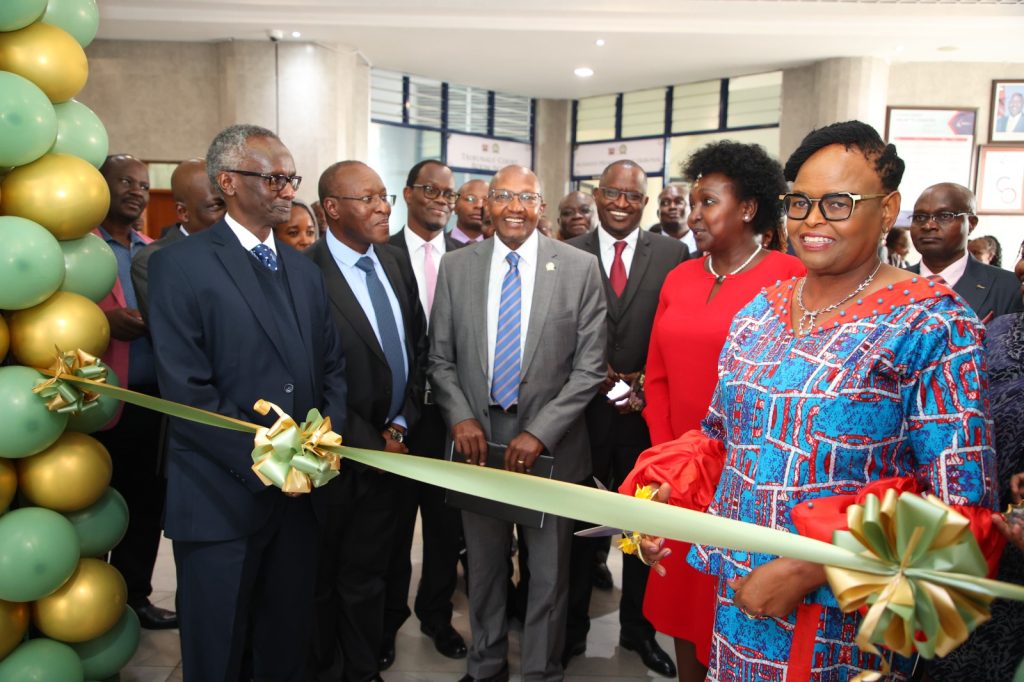In a bold move to overhaul Kenya’s justice system, Chief Justice Martha Koome on Friday, August 23, 2024, unveiled three transformative initiatives aimed at enhancing service delivery within the country’s tribunals: the Tribunals’ Shared Service Infrastructure, the Tribunals’ Website, and the Tribunals’ Registry Manual.
The Tribunals’ Shared Service Infrastructure represents a significant shift in how justice is administered, centralizing all tribunals under one roof at Kenya Re Towers in Nairobi.
This consolidation addresses a long-standing issue where tribunals were dispersed across the city, making it challenging for citizens to access justice.
The new centralized hub offers a streamlined, one-stop location with shared administrative services, simplifying the process for those seeking tribunal services.
Complementing this physical infrastructure is the launch of the Tribunals’ Website, a digital platform designed to make legal information more accessible to the public.
The website provides a comprehensive resource for Kenyans, offering guidance on how to lodge cases, access cause lists, and track tribunal sessions beyond Nairobi.
This initiative is part of a broader effort to leverage technology in expanding access to justice across the nation.
To further enhance consistency and efficiency, the Tribunals’ Registry Manual was introduced to standardize operations across all tribunals.
Historically, each tribunal operated independently, leading to confusion and inefficiency.
The new manual seeks to harmonize processes, ensuring that all tribunals follow a uniform set of procedures, thus improving clarity and predictability for litigants.
In her remarks, Chief Justice Koome emphasized that these reforms are a key step in transferring tribunals from the Executive branch to the Judiciary.
“These initiatives mark a significant milestone in transitioning tribunals from the Executive to the Judiciary, with 26 tribunals now fully integrated into the Judiciary.
“This transition is vital in aligning these tribunals with the Judiciary’s core principles. Moving forward, all tribunals are expected to adhere to high-performance standards, embrace technological advancements, and adopt innovative practices to ensure efficient and fair service delivery,” she stated.


Measuring the impact of reforms
The impact of these reforms is already being felt.
According to Chief Justice Koome, the tribunals have achieved a remarkable Case Clearance Rate of 111% in the last financial year, resolving 15,173 cases against 13,712 filed.
The Rent Restriction Tribunal, the Business Premises Rent Tribunal, the Tax Appeal Tribunal, and the Cooperative Tribunal emerged as leaders, posting the highest clearance rates.
Moreover, the Judiciary Performance Management and Measurement Unit (PMMU) recently recognized several tribunals, including the Sports Disputes Tribunal, Tax Appeals Tribunal, and Business Premises Rent Tribunal, as top performers in its annual evaluation.
The Political Parties Dispute Tribunal also played a pivotal role during the 2022 electoral cycle, swiftly resolving pre-election disputes and contributing to the smooth conduct of the general elections.
However, Chief Justice Koome acknowledged that the journey to fully transition the tribunals is not yet complete.
The absence of a legislative framework to streamline tribunal operations remains a significant hurdle.
She expressed gratitude for the government’s support, particularly the Cabinet’s approval of the Tribunals Bill last year, and urged the National Assembly to expedite the legislative process to finalize this crucial transition.
These initiatives, as Chief Justice Koome underscored, are more than just procedural changes—they represent a fundamental reimagining of Kenya’s justice system, one that seeks to bring fairness, efficiency, and accessibility to all citizens.










